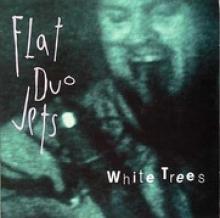Dexter Romweber has remained a featured name in independent music for about twenty years at this point. By beginning to rework country, folk, rockabilly and unconstrained rock and roll during the early ‘80s made him a lynchpin in the record collections of folks that would go on to reinvigorate garage during the ‘90s – Jack White likes dropping his name. And while Romweber hasn’t – and probably won’t ever – reach the level of renown his progeny has, it doesn’t matter. The guitarist and growlin’ singer sees no reason to augment his take on a darkly gothic Americana.
Gothic might be misleading. This isn’t Danzig related. Instead, lyrically, the Flat Duo Jets, Romweber’s group before heading out on his own, revitalized the sleazy elements that made the Sun Records crew so dazzling in the first place. And even with the fact that the resultant music wasn’t new – or intentioned as such – didn’t stop the band from accruing a pretty big following. Probably, part of that was as a result of getting a few minutes of face time in the Athens, Ga documentary Inside Out which included everyone from REM to the B-52s. If that appearance hadn’t occurred, though, the nine long players that the group recorded between ’84 and ’98 would have been ample promotion.
Despite having recorded for such a litany of labels and with as many different producers, the Flat Duo Jets sound was pretty consistent. There would be slight variations – the ‘Duo’ would actually record as a trio for their self titled disc that was set to tape during the ‘80s, but didn’t see the light of day until grunge was about to burst. This musical shift in focus of the Americans, though, didn’t deter the band. Instead the Flat Duo Jets, arguably, entered is classic period working with Norton Records, an imprint known for many things, but specifically, its devotion to rootsy, dirty noise.
The three discs that the Duo recorded with Norton, though, was preceded by a single disc on the Sky imprint. White Trees wasn’t radically different than anything that came before or after it. The disc was comprised of a spate of tunes that sought to tie lovelorn American music from the past to a modern execution all with a sneer accompanying every track. At times, Romweber’s growl seems a bit too obvious, as on the poorly titled, but adroitly performed “Cool Boys.” What saves the track is the chorus amidst that seemingly forced gravel being emitted from the singer’s throat.
A number of high points do rescue this disc from middle of the road nostalgia. The fifty second interlude, with its banjo and bucolic touch separate it from everything else here and leave listeners wanting a bit more of the same. It might have been a studio throw away, but it worked. “Where Are You Now,” penned by Crow, the band’s drummer, inserts more than a bit of punk into the song and lends the album it’s most aggressive moment. This might not be the pinnacle of the group’s career, or the lead up to the impending garage explosion, but ample it is.
